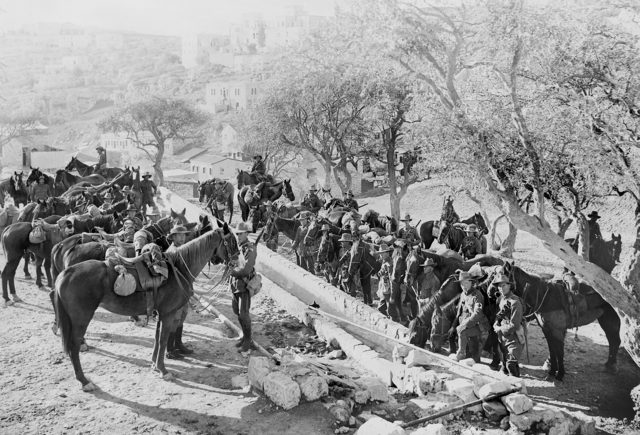Australia/Israel Review
The ANZACs in Hebrew
Jan 27, 2023 | Judy Maynard

Many Australians are aware of a century-old connection between their country and the land that was to become Israel, a link forged by the courageous exploits of the ANZACs in the Palestine Campaign during World War I.
Especially enduring in the national psyche is the daring mounted infantry charge by the men of the 4th and 12th Light Horse Regiments on October 31, 1917. Bayonets in hand, rifles slung over their backs, they charged at the Ottoman trenches, into gunfire, riding onwards to take the town of Beersheba. This was the breakthrough needed to end a stalemate in southern Palestine and enable the Allied advance. Jerusalem was captured six weeks later.
But it is unclear how much most Israelis know about this slice of shared history.
This knowledge gap was something expat Aussie Geoff Toister sought to fill, after coming across the book Australia in Palestine, a 1919 anthology of mostly contemporary observations by soldiers in the field. Published as a kind of souvenir of the war, the original English version can be downloaded for free from the Project Gutenberg website.
Toister, a retired teacher, archivist and lexicographer who now lives in Tel Aviv, set about translating the work into Hebrew for the benefit of Israelis and Hebrew-speakers everywhere, including those residing in Australia.
The book holds a particular appeal for Toister due to his family’s own Australia-Israel nexus, also 100 years old. His father Joe was born in Tzfat in 1915, and recalled receiving chocolates from slouch-hatted Australian soldiers passing through the town in 1918.
In the 1930s, Joe’s father Avraham, who had also been born in Tzfat, spent time on a cattle station in Western Australia’s Kimberley region, before returning to British Mandate Palestine, leaving another son, Sam, in Perth. Tragically, Avraham was murdered in the 1938 Arab riots, after which Joe left Palestine for Australia to join his brother Sam. Sam would go on to serve in the Australian Army during World War II.
Containing a preface by Lieutenant-General (later General) Sir Harry Chauvel, Commander of the Desert Mounted Corps, the volume includes succinct battle reports by co-editor HS Gullett. Gullett enjoyed a distinguished career as a war correspondent, a contributor to the official history of Australia’s involvement in the First World War, and a federal cabinet minister.
There is, however, a great deal more, and it is the soldiers’ personal reminiscences that Toister regards as the most interesting part of the book: their living conditions, the food, their officers, their longing for Australia, their horses. The fact that their gallant horses, the Walers (short for New South Walers), had to be left behind in the Middle East for quarantine and economic reasons makes these contributions poignant reading.
For example, in one of several poems in the anthology, “The Horses Stay Behind”, “Trooper Bluegum” contemplates the fate, and possible ill-treatment of “my broken-hearted waler with a wooden plough behind.” The last stanza reads:
No; I think I’d better shoot him and tell a little lie:—
“He floundered in a wombat hole and then lay down to die.”
May be I’ll get court-martialled; but I’m damned if I’m inclined
To go back to Australia and leave my horse behind.”
Amongst other inclusions in the collection are a reverie by Gullett’s co-editor Charles Barrett on the wildflowers of Palestine, in particular the red poppy – “our flower of War, and in the tranquil days of Peace … our flower of Memory” – and tales of encounters with the locals:
“[T]here were occasional brief seasons of rest, and the happiest of these were spent in the neighbourhood of the Jewish orchard settlements… But as the Regiments made ready for the road that morning it was pretty to see Jewish families visiting their favourite officers and men in the bustling camp, and wishing them God-speed with a sincerity and a touch of distress quite unmistakable. And all ranks rode to that bitter fight the stronger and better for those Jewish good wishes.”
It was not, however, the mere presence of an Australian fighting force in what was then Palestine that was to create the lasting connections.
The Battle of Beersheba took place on the same day the Balfour Declaration was adopted by the British cabinet. The Declaration, signed two days later, expressed support for “the establishment in Palestine of a national home for the Jewish people.”
In his speech in Beersheba at the centenary commemoration of the battle, then-Australian Prime Minister Malcolm Turnbull told the gathering, “They spurred their horses through that fire, those mad Australians, through that fire, and took the town of Beersheba, secured the victory that did not create the State of Israel but enabled its creation. Had the Ottoman rule in Palestine and Syria not been overthrown by the Australians and the New Zealanders, the Balfour Declaration would have been empty words. But this was a step for the creation of Israel.”






